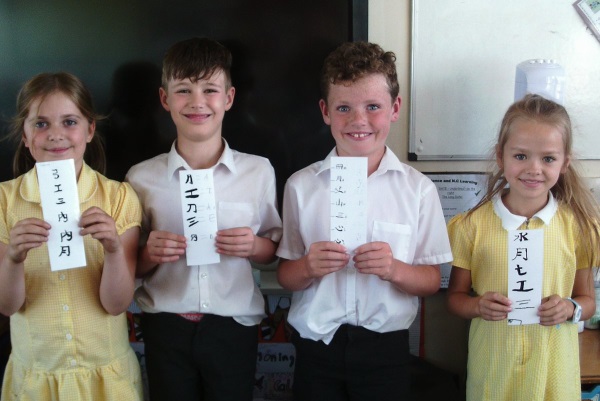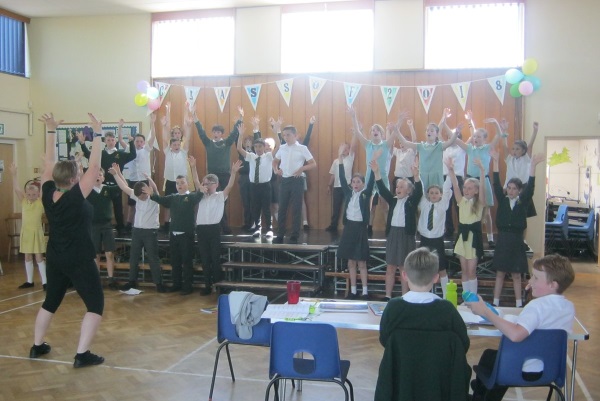How do we stop creative subjects being squeezed out of the curriculum? Elizabeth Holmes spoke to the headteacher of one primary school that is keeping the arts in the picture.

Pupils at Ashdown Primary School proudly displaying their work. The school recently held an ‘exploration day’ for arts and languages. Source: @AshdownPrimary
The impact of funding cuts and the pressure to prioritise core academic subjects has led many schools to spend less on the creative arts, and narrow the curriculum choices available to their pupils.
This is not a new phenomenon. For several years, prominent figures in the worlds of art and education have expressed concern at the slow deprivation of creative subjects such as music, art and drama in schools. Chief inspector of Ofsted, Amanda Spielman has praised ‘academic subjects’ as the best route to higher or vocational education, particularly for working-class children.
But in a growing number of schools, the lasting damage of this approach is plain to see: plenty of English and maths displays lining the corridor walls, while the arts slip further and further out of frame.
How do the teachers and school leaders who value the benefits of learning about and through the arts, continue to place emphasis on creative subjects in the curriculum? How do they make pupils’ creative achievements a source of inspiration?
I caught up with Kate Owbridge, headteacher at Ashdown Primary School in Crowborough, to find out about their approach.
KO: ‘“Wouldn’t it be boring if we were all the same?” my mum used to say. Every child is different, every child has its own strengths and weaknesses, every person does. That is why it is important for children to have access to a wide range of educational experiences and learning during their primary years. Not one of us knows what we might be unlocking inside a child. Surely that is why we all went into this game in the first place?’
Absolutely. But is that becoming more difficult to achieve in the current climate? What is your experience?
‘As a two-form entry school, we group our subjects together and have a team developing each group. One of our teams is responsible for “languages and the arts”. This includes music, art, drama, some dance and Spanish.
‘As with any subject, the team is responsible for the curriculum, lesson planning and delivery, the quality of learning, monitoring and CPD. In this respect, they are on equal footing with every other team. There is no “squeezing out” of these subjects in our school.’
That sound incredibly positive. How does it work?
‘The curriculum is tight. All foundation subjects are offset against each other (with the exception of PE and PSHE). This means that over a year there will be three half terms where we teach each subject. Our curriculum is designed so that this is not exclusive. If learning comes up during a topic focus then it can be taught.
We encourage class teachers to show examples of learning in all areas of the curriculum, including the arts
‘We found that by relaxing the time expectations, we could teach the arts (and other subjects) properly. We do employ a Spanish teacher and a music teacher, but they only work two afternoons per week and hold their sessions during class teachers’ PPA time.’
How do you maintain a focus on the arts throughout the academic year?
‘Every curriculum team has one ‘focus day’ per year, and every third year a ‘focus week’. What we cover in the day or week is up to the team to decide, which is why it’s often the time that we explore the more exciting or unusual aspects of our pupils’ learning.
‘Each class has the opportunity to hold its own assembly once per term, and we encourage class teachers to show examples of learning in all areas of the curriculum, including the arts. We also invite parents to these assemblies, and they really enjoy them!
‘Resources are just as important. Each pupil is given a learning book for their non-core subjects, as well as a sketch book for art. We have invested in these sketch books, which are made of good quality paper. They are available for parents to see when they attend parents’ evenings.’

Year 6 pupils rehearsing for their production of 'Beauty and the Beast Jnr.'. Source: @AshdownPrimary
It sounds like the more value a school gives to the arts, the more pupils will too. Does your approach have the backing of governors?
‘Our governors have a three-year rolling programme of 10-minute presentations, with time to take questions from curriculum teams. Each term a core team (annually) and a foundation team (every third year) will present to the governing body. This is to cover the highlights from each subject, the quality of teaching and learning, the use of funding and so on. The team will put together a budget bid and action plan, and we will allocate funds accordingly.
‘Inevitably English and maths are our financial heavyweights, but that’s only because they are taught more often. Every subject gets something. If there’s ever a year when we allocate no money to the arts, rest assured that no other subject will have money either!’
How do you utilise the artistic talent in your local community to create opportunities for learning in school?
‘Every class is expected to have a visitor six times over the course of the year. Some of these visitors come with historical crafts to do, chocolate to make, sketches to draw or instruments to play. We also have a choir, an art club and a drama club, which run after school. We make a small charge for these clubs (£10 per half term) and the money goes back into the extended schools budget to pay for the support staff who organise the clubs and the resources they use.’
It’s clear that you champion the arts in such a visible and tangible way, and that you’re seeing the benefits as a result.
‘The arts are as important as every other subject. I am biased, having been a music specialist, but it remains fair to say that no subject is unquestionably more or less important than the others. And it is how well the arts can complement maths and English that makes them such perfect curriculum fellows!
‘I am still hoping for the next Damien Hirst, Darcy Bussell or Idris Elba to come from the small but significant beginnings we have made at Ashdown Primary.’